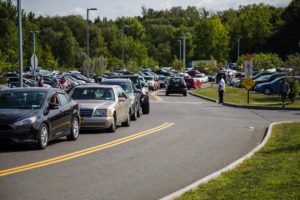Blackout causes answered, but the damage is done
Zoe Deno
Staff Writer

The blackout that forced campus to close the first Thursday of the school year was caused by a popped circuit.
“If you are a student and you are sitting there for an hour as the power went off that’s not fair to you,” said Richard Edwards, director of the Physical Plant. “You aren’t getting your money’s worth, and the college is very sensitive to that.”
Blackouts have been a problem on campus since the Co-Generation Plant was built in 2004. When the plant was first built, the campus initially had up to four blackouts per day. Since the plant has been built, the college has spent almost 2.5 million on upgrades, which decreased the number to seven blackouts this year, only two of which sent the students home.
The day of the massive blackout, there had been a popped circuit leading to the loss of power. Hudson Valley only allows for power to be out for an hour before the school must close, and by the time the plant workers had fixed the problem, the hour was up and evacuation was already in motion.
Despite the improvements to the plant, the college acknowledges that something else was needed to help stabilize power.
“The Board of Trustees approved a plan last year to stabilize power by tying into National Grid, meaning that now National Grid will provide additional power to the college as a backup,” said Dennis Kennedy, director of communications and marketing. “We will still be using the green energy of the plant, but whenever it gives out, we will have National Grid to back us up.”
The new system will be tested after this semester in December during Christmas break so that if anything were to go wrong, it won’t affect students.
During the chaos, students lost a day of classes as they were forced off the campus with little explanation.
Chris Folk-Freund, a nursing student, recalls being stuck in his class and doing nothing for several minutes. His teacher was reluctant to release them as they struggled to figure out what was going on.
“They really need to have a plan for this,” he said. Folk-Freund was also stuck in traffic for two hours because he couldn’t get right out of his class.
The frustration was universal as students like Ally Vanyke, a liberal arts student, said she ended up simply ditching her car and walking home.
“I only live a few minutes away from here, so it made more sense to just walk. People were waiting so long that a lot of them had their cars parked, and the guys directing traffic weren’t really doing anything. I wasn’t about to waste my gas trying to get out of that,” she said.
“I’m a volunteer firefighter and I’ve never seen traffic that bad,” said Zachary Sheppard, a student training to be a paramedic. “Even if the security personnel were able to sort traffic more efficiently, it wouldn’t have made a huge difference unless they could regulate the flow of traffic – for example, letting each building out at a different time – or adding extra exits.”
Several students, like psychology major Michael Miller, were able to rush to their cars as soon as they heard the news and slip out the South Entrance, taking a left and beating the traffic.
Fred Alberti, director of Public Safety, explained that because all students seemed set on leaving out of the North Entrance, getting them out efficiently became very difficult.
“If people had just taken a left, detouring to I-90, the traffic would have been a lot lighter,” he said.
Initially, security had strategically blocked off certain parking lots, leaving students parked there to wait in frustration while officers tried to empty the lots closer to the front.
While many students didn’t suffer any negative academic repercussions, after escaping the traffic students either enjoyed the day off or were left frustrated and stressed out.
William Winkley, an individual studies major, recalled having his biology lab canceled despite the fact the Science Building had power. He had to do a makeup lab on top of his schedule the following week.
“This is bad now, but it would be really bad if this happened the week of the finals,” said Nick Seaberry, a business administration major.
“It is extremely rare that we have to execute a collage closure in the middle of the day,” said Kennedy. “We hope that the additional power from National Grid will avert any future inconveniences like this to the students because your success is our priority.”
